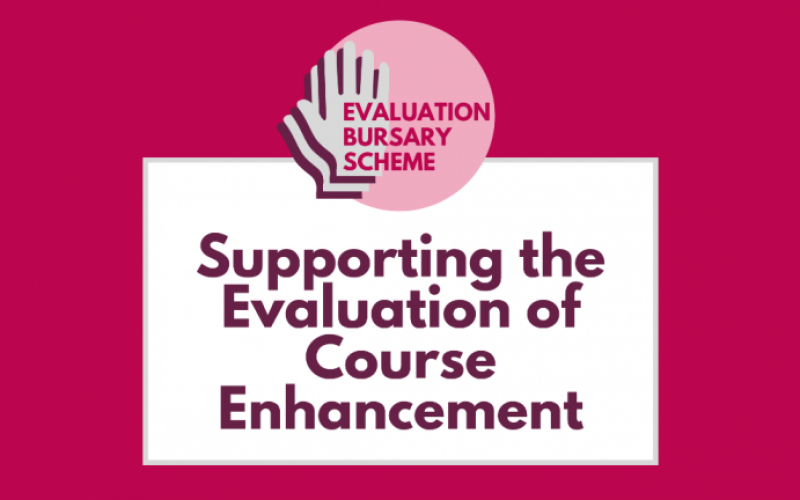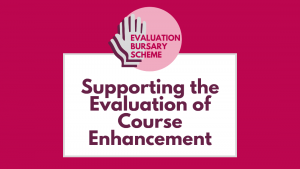New SETL/STEER Course Evaluation Bursary Projects Announced
This blog provides an overview of the SETL/STEER led Evaluation Bursary Scheme. In September 2021, nine applicants were granted up to £1,000 to focus on an action from their Course Improvement Plan. Each Project Lead and the student researchers working with them will receive a comprehensive package from SETL/STEER that includes training and development workshops, online resources, and tailored support with developing and evaluating these initiatives.


In the summer of 2021, the Directorate of Student Experience, Teaching and Learning (SETL), incorporating Student Engagement, Evaluation and Research (STEER), were pleased to launch a new Evaluation Bursary Scheme. This Scheme recognises that the time, space, and capacity for evaluation within teaching and learning/student success can sometimes be challenging and the Covid-19 pandemic may have compounded this.
Scheme Overview
This new Scheme runs in parallel to College-funded Enhancement projects. It specifically aims to supports Course Leaders from across the University with:
- developing and applying an evaluative mindset approach to course improvement;
- increasing perceptions of the value of engagement in the process;
- improving the quality of action planning in the Course Improvement Plan; and
- enhancing student experiences through evidence-informed decision making.
Through this Scheme, each successful applicant is granted up to £1,000 to collaborate with both student researchers from the SETL/STEER pool and student participants in gathering student voices (see, for example, Austen, 2018) through designing, evaluating, and disseminating course enhancement initiatives. Through this community of practice, each Project Lead and the student researchers working with them will receive a comprehensive package from SETL/STEER that includes training and development workshops, online resources, and tailored support with developing and evaluating these initiatives. The University’s Head of Evaluation and Research, Dr Liz Austen, notes
“this Scheme is an excellent opportunity for STEER to support course enhancements across the institution and, crucially, the evidencing of impact. Working alongside students and developing relationships with staff in Colleges should also be really beneficial for all involved.”
Successful Applicants
Following considerable interest in the Scheme, the applications were reviewed by a panel of stakeholders involved in teaching, learning, quality, student engagement, and evaluation. Following the panel’s recommendations, SETL/STEER are delighted to announce that they will be funding a total of nine projects this academic year across all three Colleges of Business, Technology and Engineering, Social Sciences and Arts, and Health, Wellbeing and Life Sciences. Both the team and the panel were pleased to see such a variety of initiatives around key themes including the degree awarding gap, HE-industry partnerships, employability and careers development, digital teaching and learning platforms, and apprenticeships. Further details about the projects are listed below. The Project Leads are looking forward to getting started with their Projects. One of the Project Leads, Dr Lizzie Freeman, a Senior Lecturer within the College of Social Sciences and Humanities notes how her previous involvement in the College-funded Enhancement Projects inspired her to apply for the new Course Evaluation Bursary Scheme:
“funding really does make a difference. The…wealth of support and advice is invaluable in the efforts to improve student engagement and experience. Winning funding and getting feedback from the review panel reinforces… self-belief… College funding also leads to exploring and having confidence in applying for other funding like the Bursary Scheme and other larger funding bids. I can’t recommend it enough.”
Asif Majid, a Senior Lecturer in Strategic Management, Enterprise, and Innovation, is leading on a Course Evaluation Bursary Scheme project around the use of digital learning platforms to build course communities. Asif commented that ‘the bursary scheme came at an opportune moment that will allow the Evaluation of Microsoft Teams as a Course Community Platform and will engage academic staff and students from level 4 to level 6’.
Within the College of Health, Wellbeing and Life Sciences, Dr James Rumbold successfully bid for funding and notes how he applied for the Scheme because:
“it provides an opportunity to work in collaboration with our course student representatives, student researchers and the student cohort to co-design a series of symposia workshops that bridges this imbalance. We believe this bursary will strengthen student’s understanding of what knowledge and skills they need to develop in the long-term, and what external networks they need to build to enhance their future employability prospects.”
Projects Leads and Project Summaries
Miyoung Oh: The project is to help PESS staff to understand ways in which the course is colonised so that they can decolonise it and provide fairer education to current and future students. In particular, the project seeks to investigate how to decolonise the course from ethnicity and disability angles. The project aims to examine pedagogies, module content and materials staff use and provide staff with recommendations to help them decolonise their modules and practices, and the course.
Alex Hamilton: Understanding the impact of the colonised nature of the traditional chemistry curriculum is the first step to driving positive change and widen participation within the chemical sciences. This project aims to integrate the important research conducted by chemists from ethnic minorities and the Global South into our students learning.
Lada Price: The overall aim of the project is to establish a successful partnership with the BBC’s 50:50 Equality Initiative. This involves embedding diversity of sourcing in practical journalism projects and assignments and data collection using BBC’s methodology and self-monitoring system. Data collection will be guided by the BBC’s approach ‘count, share.
Jane Gurman: Across undergraduate courses in Biosciences and Chemistry a need to embed and enhance the understanding and application of Big Data was identified. We will investigate the barriers to student engagement; the requirements of placement and graduate employers for these skills; and design a student-centred learning package to embed data set analysis with introductory programming at level 5.
James Rumbold: The project will evaluate the effectiveness of a co-design course approach to improving postgraduate students career readiness. Two course representatives and teaching staff will work together with MSc sport and exercise psychology students to develop three tailored career development workshop symposia. The project will be qualitatively evaluated by student researchers.
Vicky Mellon: Establish a student research group to provide greater understanding and a review of areas in the course which have received low NSS scores through the STEER/SETL Evaluation CIP Bursary. This would include student researchers working with Alumni and current final year graduates to understand their experiences of SHU in relation to areas of NSS priorities as set by the university. Analysis from this data would lead to recommendations for improvement to the low scoring areas of NSS on the BSc International Tourism Management.
Elizabeth Freeman: BSc Psychology are looking to explore the barriers and enablers to peer mentoring and evaluate our many enhanced course activities, which will also contribute to better communication strategy as a poor or misinformed approach often undermines efforts to improve student engagement and experience.
Aimee France: The study will explore the experiences of the first cohort of BSc (Degree Apprenticeship) Physiotherapy learners who are due to complete their studies in August 2021. Semi-structured interviews will be conducted with the learners and the data analysed using thematic analysis. The results of the study will be disseminated locally and nationally and used to inform future developments and deliveries of the programme.
Asif Majid: Microsoft Teams is a collaboration online platform that can bring groups of people together for work, projects, or common interests. This study will evaluate the effectiveness of the platform in building course communities and establishing a broader multilevel network. The findings will be disseminated through university forums, conferences, and a journal publication.
For further details about the Course Evaluation Bursary Scheme, please contact either Dr Jill Dickinson (jill.dickinson@shu.ac.uk) or Tom Savage (t.savage@shu.ac.uk).
